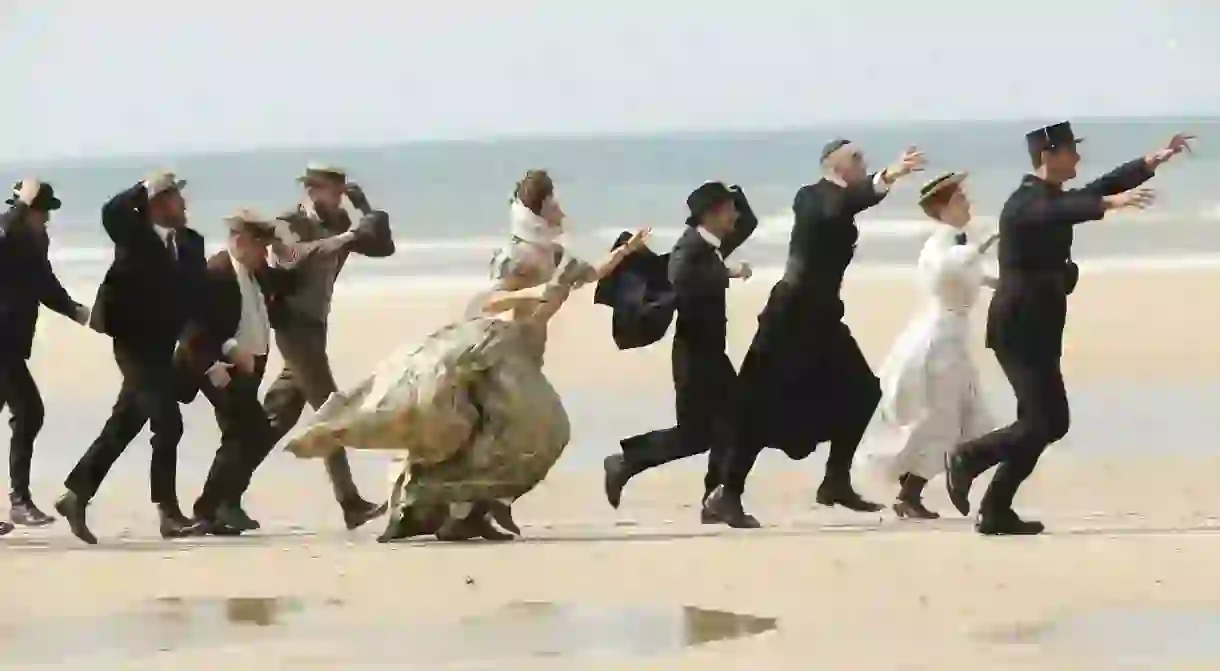You Won't Believe Juliette Binoche in the Mad Mad Mad Mad "Slack Bay"

If you hated Downton Abbey, you’ll love Bruno Dumont’s hilarious Belle Epoque-era beach comedy – severed foot and all.
Who knew Juliette Binoche could be a ham? Gushing and simpering, squawking and kvetching, her stuck-up bourgeoise, Aude, in the gonzo French Guignol farce Slack Bay (Ma Loute)is unlike any previous Binoche character. She weeps and faints extravagantly, even when no one is watching, and specializes in lightning-fast mood swings.

Since Bruno Dumont’s movie is set in 1910, one feels that this flouncing narcissist’s wide-berth air-kissing technique could have taught the Titanic‘s lookouts the meaning of evasiveness. Binoche’s unbridled turn is tremendous fun to watch—she should horribly overact more often. Dumont must have rewarded her with the part for eliciting her tormented performance in Camille Claudel 1915 (2013), which starred Binoche as the institutionalized sculptress.
Slack Bay is the second consecutive comic murder mystery made by Dumont following his masterful 2014 miniseries Li’l Quinquin, the police investigation in which was triggered by the discovery of human body parts in a cow’s stomach. His first seven films are brutalist dramas, Bressonian in their austerity, that feature descendants of the old French peasant class. They view religious devotion and the slaking of sexual appetites with a chilly mix of secular cynicism and anthropological objectivity. His comedy phase is issue-driven and limned with darkness.
Like most people who need to be the center of attention, Aude is oblivious of others’ feelings. Arriving at the faux-Egyptian seaside villa owned by her maundering hunchback brother André Van Peteghem (Fabrice Luchini) and his uptight wife Isabelle (Valeria Bruni Tedeschi) in north-eastern France, Aude cruelly thrusts away her teenaged daughter, Billie, who’s been vacationing with her younger cousins (Lauréna Thellier, Manon Royère).

When the incensed Billie then runs away, Aude exclaims, “He has such a temper, that one. Just let him sulk, girls.” It’s one thing to slight a daughter; its another to mistake her for a boy, even if she male-identifies. Wistfully portrayed by the newcomer Raph, the androgynous Billie is the ensemble film’s most likable figure.
Naturally a cross-dresser, Billie has to wear Edwardian femme-drag to sustain her new romance with La Loute (Brandon Lavieville), the filthy, jug-eared son and co-worker of the impoverished local ferryman. The revelation that leads to Billie being viciously gay-bashed lends to his/her sympathetic modernity as a gender-fluid “normal” amid the film’s array of toffs, buffoons, and degenerates. Billie’s ability to cross class lines is contrasted with the snobbery of her mother, a Belle Epoque poseur who has come swanning in from Tourcoing with patronizing platitudes on her lips.

The ferrymen are scarcely underclass angels. They have started killing their fares and bringing them home so the ferryman’s wife (Caroline Carbonnier) can cook them for the family’s meals, there being three voracious tykes to feed. The reported disappearances have prompted an investigation.
Whereas the bumbling police captain tasked with solving the murders in Li’l Quinquin suggested a Tati-esque Maigret with less social skills than Inspector Clouseau, the guileless police chief Machin (nonprofessional actor Didier Després) and his dumb, Tintin-ish assistant Malfoy (Cyril Rigaux) are a Gallic Laurel and Hardy. When the outsize Machin falls over or rolls down a sand dune, he needs help getting to his feet; like Isabelle, he’s also prone to floating into the sky.

The absurd pair’s bowler hats give the film a whiff of Dadaism and René Magritte’s Surrealist paintings, while the in-bred Van Peteghems, including Aude and André’s idiot brother Christian (Jean-Luc Vincent), invoke Monty Python’s “upper-class twits”—Pythonesque, too, is the severed foot La Loute’s mother offers her hungry brood—or even the self-indulgent gentry of Jean Renoir’s La Règle du Jeu (1939).
Narrative logic being the last thing on Dumont’s mind, Slack Bay, gorgeously photographed by Guillaume Deffontaines,morphs eventually into a caper movie; think It’s a Mad Mad Mad Mad World imagined by the seascape artist Eugène Boudin. Its critique of the class war isn’t as fierce (or as poignant) as Li’l Quinquin‘s anti-racist message, but it’s a joy nonetheless.
Having since filmed an electro-pop Joan of Arc musical (the mind boggles), Dumont should be persuaded to make a Slack Bay sequel that sees Raph’s treasurable Billie negotiating gender politics during the Great War era.
Slack Bay is on release in US theaters.
https://www.youtube.com/watch?v=rhNZMXJF3Gg













